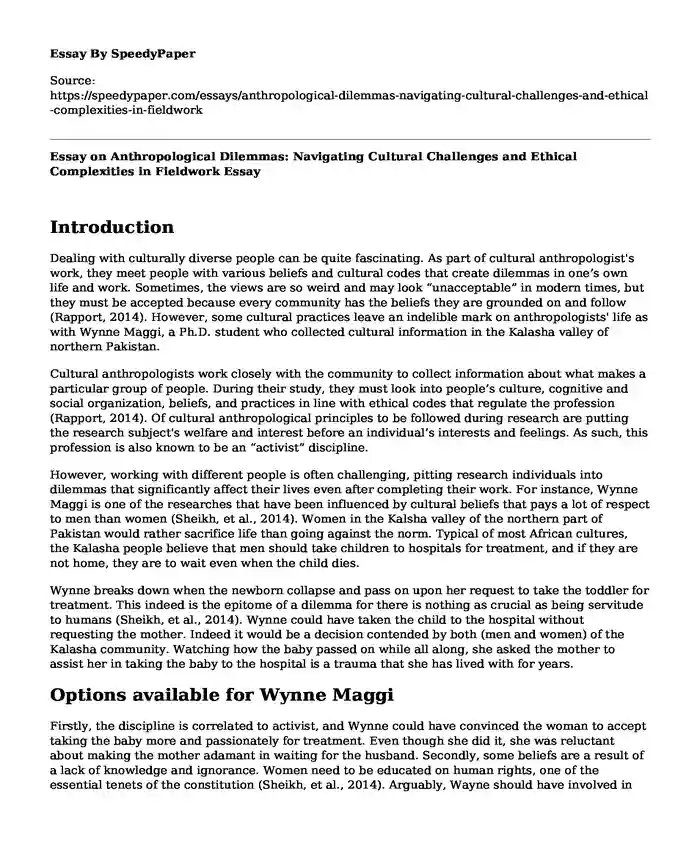
| Type of paper: | Essay |
| Categories: | Culture Anthropology Ethics Ethical dilemma |
| Pages: | 3 |
| Wordcount: | 655 words |
Introduction
Dealing with culturally diverse people can be quite fascinating. As part of cultural anthropologist's work, they meet people with various beliefs and cultural codes that create dilemmas in one’s own life and work. Sometimes, the views are so weird and may look “unacceptable” in modern times, but they must be accepted because every community has the beliefs they are grounded on and follow (Rapport, 2014). However, some cultural practices leave an indelible mark on anthropologists' life as with Wynne Maggi, a Ph.D. student who collected cultural information in the Kalasha valley of northern Pakistan.
Cultural anthropologists work closely with the community to collect information about what makes a particular group of people. During their study, they must look into people’s culture, cognitive and social organization, beliefs, and practices in line with ethical codes that regulate the profession (Rapport, 2014). Of cultural anthropological principles to be followed during research are putting the research subject's welfare and interest before an individual’s interests and feelings. As such, this profession is also known to be an “activist” discipline.
However, working with different people is often challenging, pitting research individuals into dilemmas that significantly affect their lives even after completing their work. For instance, Wynne Maggi is one of the researches that have been influenced by cultural beliefs that pays a lot of respect to men than women (Sheikh, et al., 2014). Women in the Kalsha valley of the northern part of Pakistan would rather sacrifice life than going against the norm. Typical of most African cultures, the Kalasha people believe that men should take children to hospitals for treatment, and if they are not home, they are to wait even when the child dies.
Wynne breaks down when the newborn collapse and pass on upon her request to take the toddler for treatment. This indeed is the epitome of a dilemma for there is nothing as crucial as being servitude to humans (Sheikh, et al., 2014). Wynne could have taken the child to the hospital without requesting the mother. Indeed it would be a decision contended by both (men and women) of the Kalasha community. Watching how the baby passed on while all along, she asked the mother to assist her in taking the baby to the hospital is a trauma that she has lived with for years.
Options available for Wynne Maggi
Firstly, the discipline is correlated to activist, and Wynne could have convinced the woman to accept taking the baby more and passionately for treatment. Even though she did it, she was reluctant about making the mother adamant in waiting for the husband. Secondly, some beliefs are a result of a lack of knowledge and ignorance. Women need to be educated on human rights, one of the essential tenets of the constitution (Sheikh, et al., 2014). Arguably, Wayne should have involved in the sensitization of women within the village of their right to take family values at hand. In the end, Wynne failed in her obligation. The baby boy passed on, and discouraged; she returned home after completing her dissertation research. Despite following the ethical guideline that requires one to avoid harming people in which she carries research, Wynne became part of the issue by watching as they made one last colossal gasp and passed on (Sheikh, et al., 2014).
The last point about the ethical rule is detrimental to the discipline. Ethically, one should not “interfere” with the study community, but many cultural anthropologists breach this code more often in various communities they work with during research and data collection.
References
Rapport, N. (2014). Social and cultural anthropology: The key concepts. Routledge. https://www.nps.gov/orgs/1209/what-is-cultural-anthropology.htm
Sheikh, I., Naz, A., Hazirullah, W. K., & Khan, N. (2014). An anthropological study of dress and adornment pattern among females of Kalash, district Chitral. Middle East J Sci Res, 21, 385-95. https://www.idosi.org/mejsr/mejsr21(2)14/15.pdf
Cite this page
Essay on Anthropological Dilemmas: Navigating Cultural Challenges and Ethical Complexities in Fieldwork. (2023, Dec 30). Retrieved from https://speedypaper.net/essays/anthropological-dilemmas-navigating-cultural-challenges-and-ethical-complexities-in-fieldwork
Request Removal
If you are the original author of this essay and no longer wish to have it published on the SpeedyPaper website, please click below to request its removal:
- Free Essay: Human Science Versus History and Art in Understanding Human Behavior
- The New Arab City, Free Essay in Architecture
- Ethical-Legal Dilemma in Nursing, Free Paper Sample for You
- Essay Sample on Alternatives Beyond Physical Scientific Reasoning
- Free Essay - Policy Influences on Healthcare Decisions
- Essay Example. Fetal Breathing-like Movements (FBMs)
- Free Paper on Analyzing Differences: HSM vs. SSM in Data Development and Information Engineering
Popular categories




